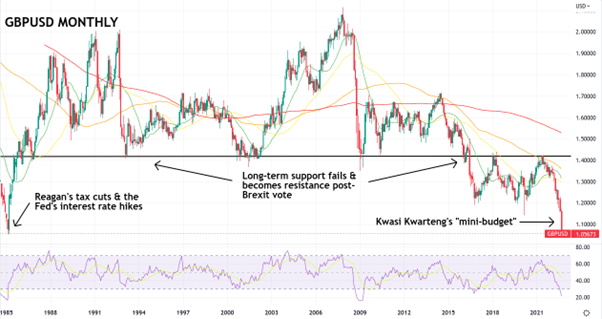As British Chancellor of the Exchequer, Kwasi Kwarteng, was busy outlining what he had dubbed “a beginning of a new era” to his esteemed colleagues in the house of commons on Sept. 23, it seems global markets had something quite different in mind.
The announcement of Kwarteng’s bold new mini-budget; a mix of fiscal stimulus and tax cuts geared at easing energy inflation for the most vulnerable while also attracting businesses to reinvigorate the UK’s business sector, left market participants nonplussed and did nothing to stop the ongoing rout in the British pound.
The sterling took a further 4.5% tumble on the day, following a 6% drop since August. The British pound has fallen by more than 9% against the US dollar in the last three weeks and more than 20% from the beginning of the year.
It closed the week trading at levels last seen in 1985 and opened in the early hours of Monday, Sept. 26, to break below that 1985 low. The extreme volatility we have been seeing in a major currency has led commentators to draw parallels between the pound sterling and emerging market currencies.

Larry Summers Criticizes The UK
Former US Treasury Secretary, Larry Summers, was extremely critical of the announced measures. In a Bloomberg interview, he said,
“I think the UK is behaving a bit like an emerging market, turning itself into a submerging market… It will not surprise me if the pound eventually gets below a dollar if the current policy path is maintained.”
The Measures
Aside from a series of fuel caps and rebates for UK households aimed at helping the British public make it through the cold months ahead, Kwarteng’s mini-budget represents the biggest tax cuts for the country since 1972.
The measures increase the amounts on a property purchase to be exempt from stamp duty from £125,000 to £250,000. Additionally, first-time buyers will now be exempt from paying stamp duty on the first £425,000 on any property purchased with a value under £625,000.
Last year’s 1.25% national insurance increase has also been scrapped, increasing the minimum incomes on which it is to be payable from £10,000 per year to £12,570. Further, the basic rate will drop from 20% to 19% this coming April.
However, the most controversial changes for which Prime Minister Liz Truss’s new government is currently receiving a great deal of condemnation is the scrapping of the caps on bankers’ bonuses implemented in the wake of the Great Financial Crisis, as well as the income tax rate of 45% for the country’s highest earners. This brings the highest payable tax rate down to 40%.
The Costs
The round of tax cuts and regulatory reforms are set to cost the UK’s government around £160 billion over the next five years, while the energy bailouts for the public are estimated to cost around £60 billion over the next six months, all of which are set to be funded by government borrowing.
UK gilt yields soared on the day as the sterling was heading south, with 5-year maturities reaching as high as 4%. STIR markets expect a full percentage point increase in the Bank of England’s benchmark interest rate to 3.64% in November from just over 3.01% a week ago.
The terminal rate is now just under 6%, up from 4.63% only one week ago. The above will drastically increase the British government’s borrowing costs, making it harder to fund Kwarteng’s policies.
Kwarteng Compared To Barber
Just as Jerome Powell has frequently been compared to Fed Chairman Paul Volcker since his hawkish turn earlier this year, Kwarteng is now being likened to former Chancellor of the Exchequer, Anthony Barber.
While history remembers Volker’s policies as successful, it hasn’t been as kind to Barber, who oversaw the short-lived “Barber Boom” of the 1970s due to tax cuts that eventually led to inflation and increased wage demands from public sector employees.
Aside from the tax breaks for the richest, which Kwarteng believes will make the UK more internationally competitive, the new measures are being criticized for providing stimulus likely to worsen inflation in the long term.
While he has carefully avoided the minefield of using the word transitory about the inflation the country is currently experiencing, it is clear that he believes the economic pain of sliding into a deep recession will be far worse.
Just A Thought
Incidentally, back in 1985, what caused the British pound to sink so low against the US dollar was more about dollar strength than sterling weakness. A massive round of tax cuts instituted by President Reagan, along with the Federal Reserve raising interest rates, caused the dollar to massively appreciate, which is more or less what the UK is attempting to do now.
High-Risk Investment Warning: Contracts for Difference (‘CFDs’) are complex financial products traded on margin. Trading CFDs carries a high degree of risk. It is possible to lose all your capital. These products may not suit everyone, and you should ensure you understand the risks involved. Seek independent expert advice if necessary and speculate only with funds you can afford to lose. Please think carefully about whether such trading suits you, taking into consideration all the relevant circumstances as well as your personal resources. We do not recommend clients posting their entire account balance to meet margin requirements. Clients can minimise their level of exposure by requesting a change in leverage limit. For more information, please refer to HYCM’s Risk Disclosure.
